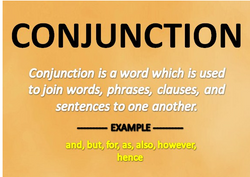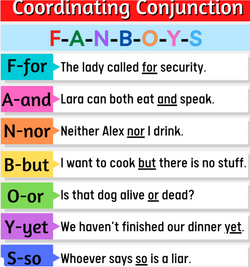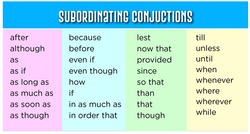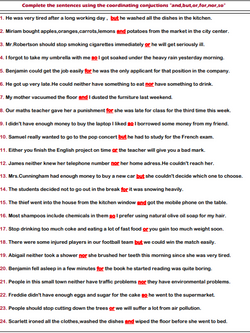Sep 29, 2022
CONJUNCTION

Conjunctions
What is a conjunction?
A conjunction is a part of speech that is used to connect words, phrases, clauses, or sentences. Conjunctions are considered to be invariable grammar particles, and they may or may not stand between items they conjoin
Examples;
‘and, but, for, nor, or, so, yet, though, although, even though, while’
1. Adam and Sara are writing letters. [Joining two words]
2. Amira is waiting for you near the temple and under the tree. [Joining Two Phrases]
3. You cannot earn money unless you get a job. [Joining Two Clauses]
4. I stopped my car but he did not do so. [ Joining Two Sentences]
In the above examples, you can see the conjunction ‘and’ joins two words (Adam, Sara), two phrases (near the temple, under the tree).
And the conjunction ‘unless’ joins two clauses ( ‘You cannot earn money’, ‘You get a job’).
And the conjunction ‘but’ joins two sentences ( ‘I have stopped my car’, ‘He did not do so’).
There are two kinds of conjunctions:
Coordinating Conjunction
Subordinating Conjuncion
COORDINATING CONJUNCTIONS
Coordinating conjunctions connect words, phrases, and clauses.
There are seven coordinating conjunctions. and, but, for, nor, or, so and yet.
To remember all of the coordinating conjunctions, we can learn following acronym:
FANBOYS –> F – for, A – And, N – Nor, B – But, O – Or, Y – Yet, S – So.

A subordinating conjunction is a word or phrase that links a dependent clause to an independent clause. This word or phrase indicates that a clause has an informative value to add to the sentence's main idea, signaling a cause-and-effect relationship or a shift in time and place between the two clauses.

For
The meaning of For is because or since. For as a conjunction is used to explain reason or purpose. (like “because” or ”since”)
Examples:
1. He doesn’t want to buy any electronic devices, for they are costly these days.
2. My teacher loves me very much, for I am a successful student.
3. I have to find a new job, for I am unemployed.
4. she gets weight easily, for she eats everything very quickly.
5. Scientists are trying to find a new livable planet, for the world is coming to an end.
And
One of the most used words in English is ‘and‘. It can be shortened by “&” sign in English. It means in addition to. And is used to connect words, phrases, or clauses that have the same grammatical function in a construction.
Examples:
1. I’m a husband and father.
2. He came into the house and the phone began to ring.
3. I have one dog and three love birds.
4. I work in a post office. And I also work in a library.
5. She talked and listened.
6. Please calm down, Let’s wait and see.
Nor
It means and not. Nor is used before the second or last of a set of negative possibilities, usually after “neither”.
Examples:
1. She didn’t talk to her friends nor did she call her family.
2. He can’t attend the meeting and neither can Ally.
3. Neither Kelvin nor Janny was at school yesterday.
4. Neither my son nor my daughter like drinking milk.
6. Today is neither the first nor the last day of the month.
7. Neither my parents nor my friends supported me.
But
The meaning of But is, however. It is used to show a disagreement between clauses, or to connect ideas that contrast.
Also But means “except” when it is used after words such as all, everything/nothing, everyone/no one, everybody/nobody.
Or
It means either. Or is used to connect different possibilities.
Examples:
1. Sally lives in London or New York.
2. Which color do you like red or blue?
3. Does Clark have any brothers or sisters?
4. Do you spend more time with your friends or with your family?
5. Teenagers need to sleep seven or eight hours a night.
6. We can cook soup for dinner, or we can just eat leftovers.
7. She studies hard for this exam or she fail.
8. I will go to the party or stay at home.
9. It doesn’t matter whether you win or lose. The most important thing is to you take part in the competition.
So
It means therefore , for that reson. So means with the result or consequence of something.
Examples:
1. She was sick, so she couldn’t attend the meeting.
2. I studied hard, so I will be successful in the exam.
3. My daughter is very smart, so everybody likes her.
4. He has a job interview, so he will go to London.
5. Jack has changed, so much over time so nobody can know him.
6. I don’t feel myself good, so I don’t want to go anywhere.
Yet
It means but. Yet is used to introduce a contrasting idea that follows the preceding idea logically.
Examples:
1. Tomy plays basketball well, yet his favorite sport is football.
2. Supporters of both teams complained about extreme heat, yet they continues to watch the match.
3. I really wanted my son to study at university, yet he left school.
4. She lost the racing, yet she was happy to take part in such a contest.
5. the things you experience are really difficult, yet you should be patient.
COORDINATING conjunctions
Complete the sentences using the coordinating conjuctions "and, but, or, for, nor,so"
1. He was very tired after a long working day, _____ he washed all the dishes in the kitchen.
2. Miriam bought apples, oranges, carrots, lemons _____ potatoes from the market in the city center.
3. Mr.Robertson should stop smoking cigarettes immediately _____ he will get seriously ill.
4. I forgot to take my umbrella with me _____ I got soaked under the heavy rain yesterday morning.
5. Benjamin could get the job easily _____ he was the only applicant for that position in the company.
6. He got up very late. He could neither have something to eat _____ have something to drink.
7. My mother vacuumed the floor _____ I dusted the furniture last weekend.
8. Our maths teacher gave her a punishment ____ she was late for class for the third time this week.
9. I didn't have enough money to buy the laptop I liked _____ I borrowed some money from my friend.
10. Samuel really wanted to go to the pop concert _____ he had to study for the French exam.
11. Either you finish the English project on time _____ the teacher will give you a bad mark.
12. James neither knew her telephone number _____ her home adress.He couldn't reach her.
13. Mrs.Cunningham had enough money to buy a new car _____ she couldn't decide which one to choose.
14. The students decided not to go out in the break _____ it was snowing heavily.
15. The thief went into the house from the kitchen window _____ got the mobile phone on the table
16. Most shampoos include chemicals in them _____ I prefer using natural olive oil soap for my hair.
17. Stop drinking too much coke and eating a lot of fast food _____ you gain too much weight soon.
18. There were some injured players in our football team _____ we could win the match easily.
19. Abigail neither took a shower _____ she brushed her teeth this morning since she was very tired.
20. Benjamin fell asleep in a few minutes _____ the book he started reading was quite boring.
21. People in this small town neither have traffic problems _____ they have environmental problems.
22. Freddie didn't have enough eggs and sugar for the cake _____ he went to the supermarket.
23. People should stop cutting down the trees _____ we will suffer a lot from air pollution.
24. Scarlett ironed all the clothes,washed the dishes _____ wiped the floor before she went to bed.

By undefined
26 notes ・ 82 views
English
Beginner